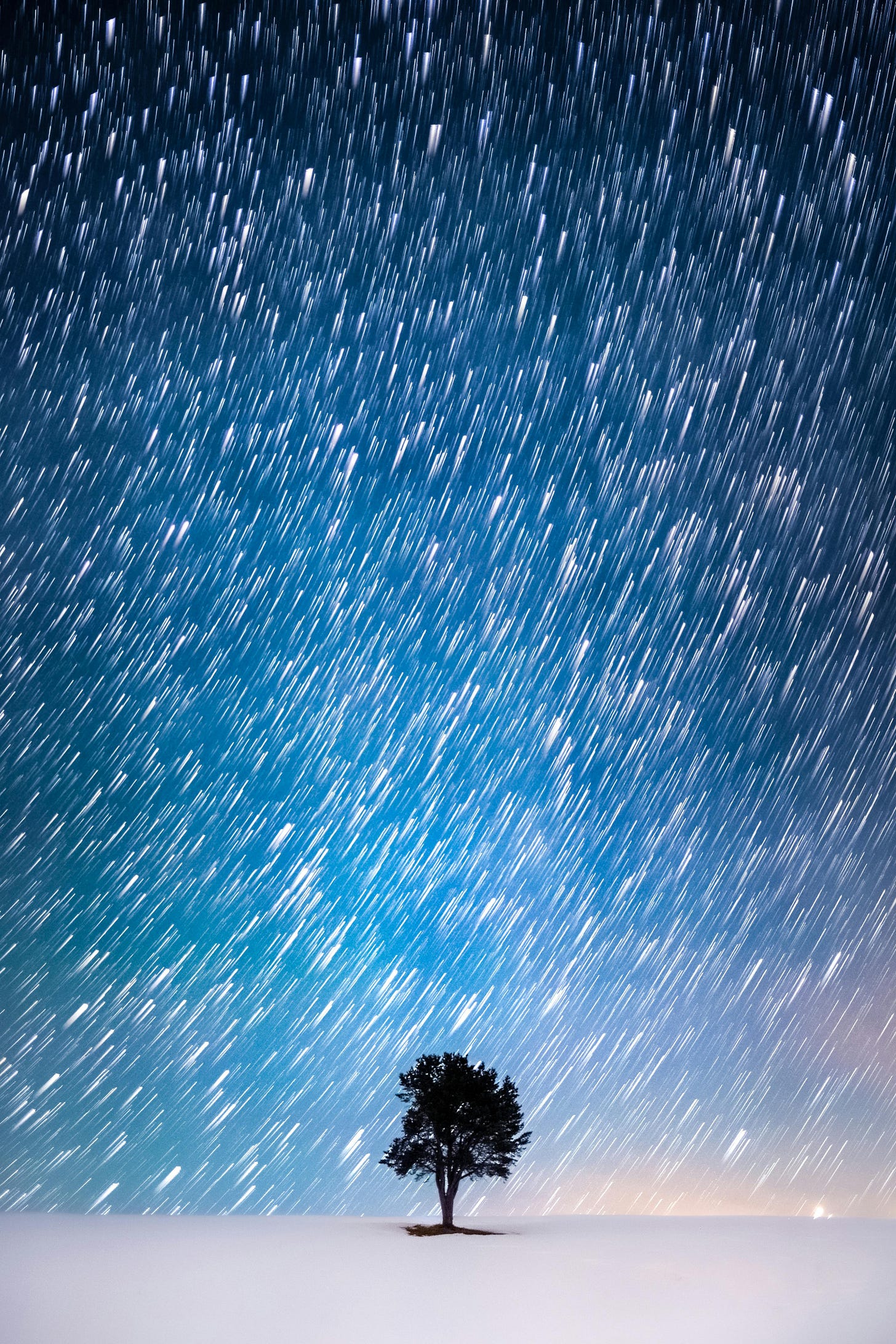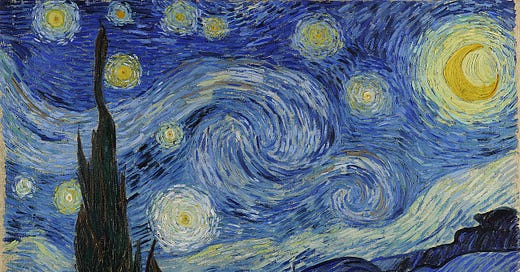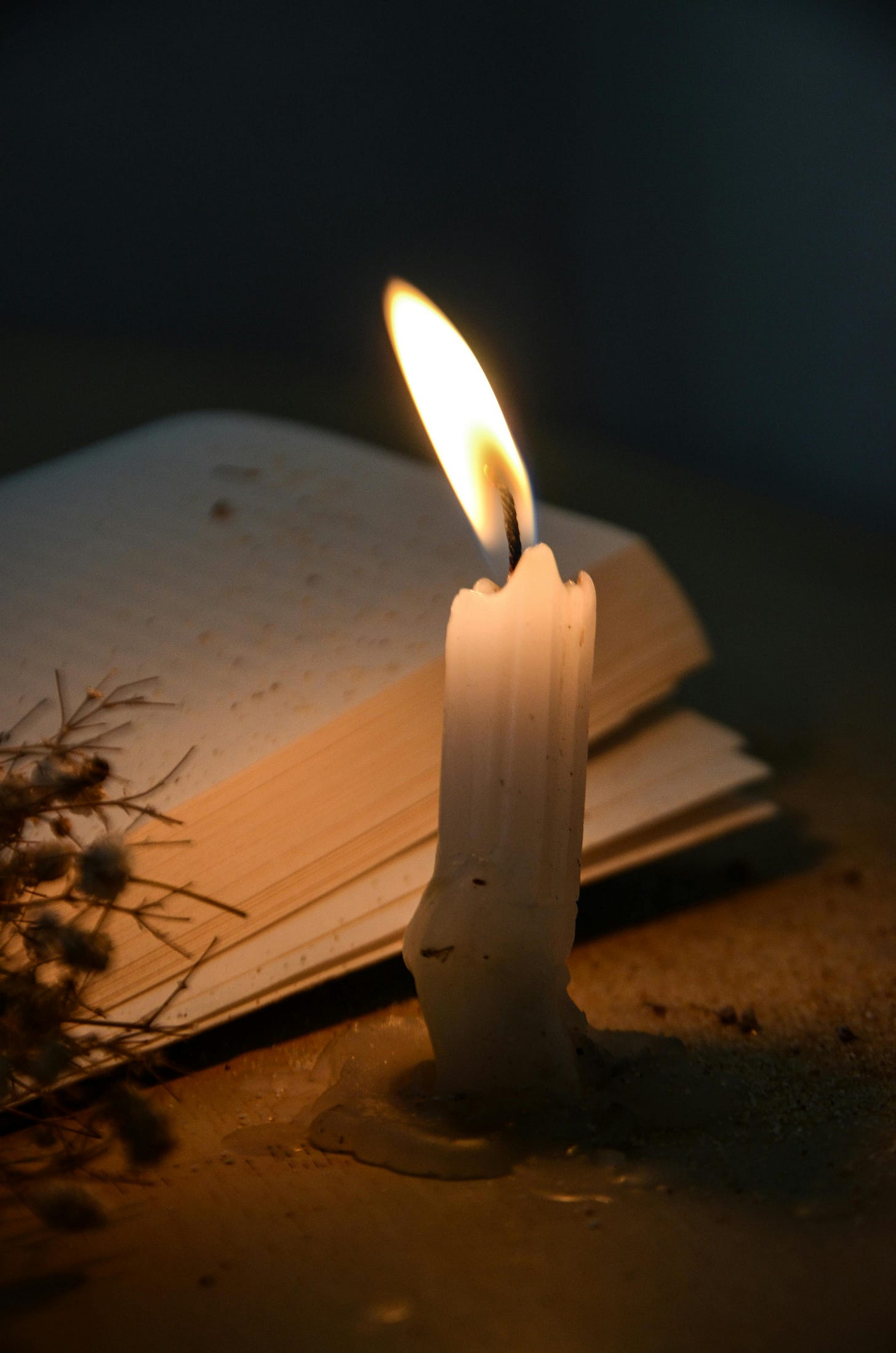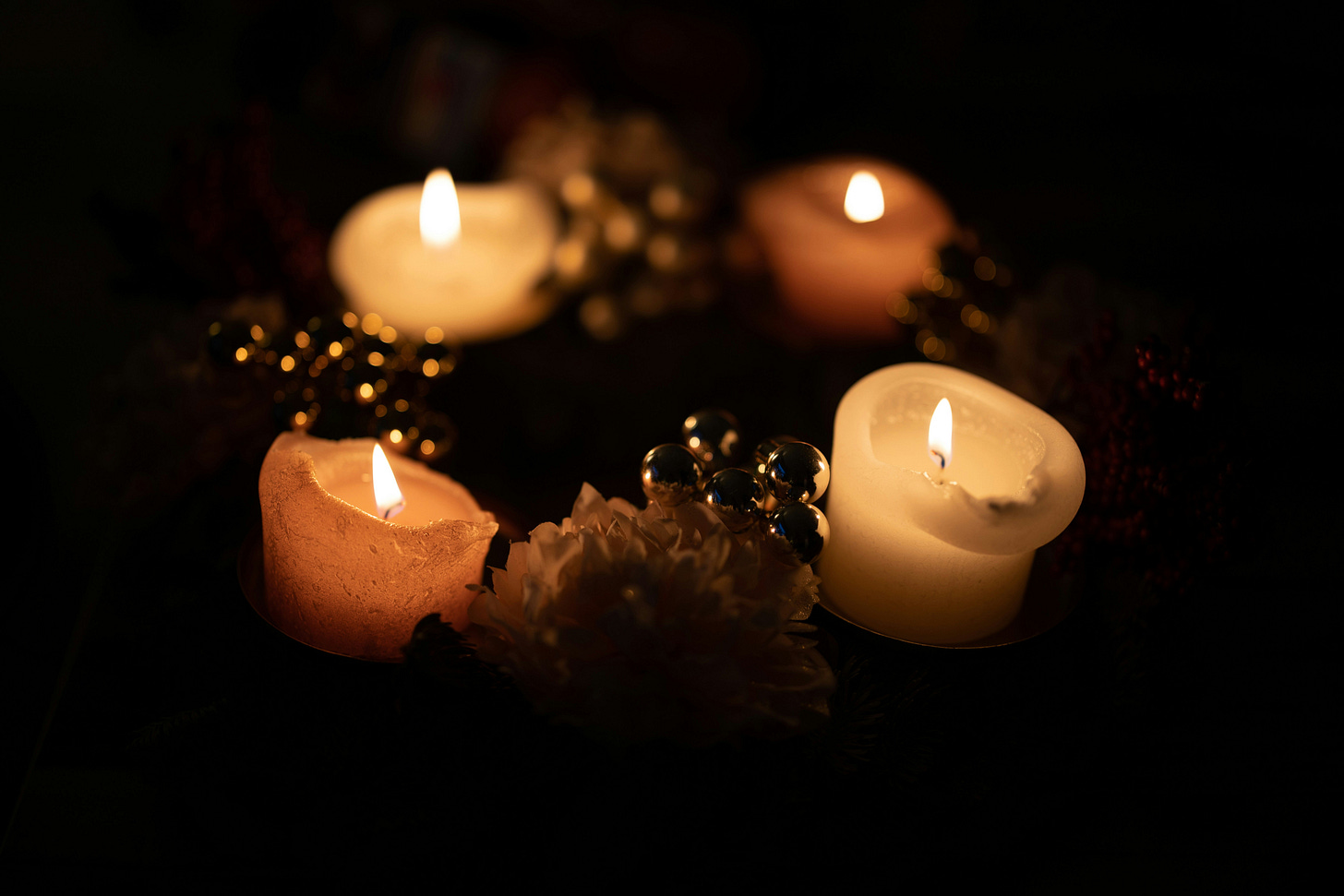The pregnant silence: why we need Advent
To those who are longing, winter's verses resonate best
Contents
Poem: Winter now your soul
Reason one: A remedy for our disaster
Poem: The pregnant silence
Reason two: Turning towards the dark
Poem: Advent carol
Reason three: The ideas born of forbearance
Darkling
Coffee
Poem: Winter now your soul
Winter now your soul. Make good of the cold.
Do not carry on as normal—
as though the long nights were not telling you
to fold into your roots, to quit your reaching,
to clear your schedule and curl into a ritual
of hushening ease.
Winter now your soul. Make good of the cold.
There is no use in clinging on—
let yourself let go; settle into deep sighs
under thick blankets, the candles summoning
dulcet shadows on the wall.
Empty is not devoid: it is the space to breathe,
the hollow for the seed, the sanctuary
in which you can slowly regather yourself.
©Gideon Heugh, Naming God
Reason one: A remedy for our disaster
‘And if you have no ceremony, no habits… how can you reach toward the actuality of faith, or even a moral life, except vaguely? The patterns of our lives reveal us.’
—Mary Oliver, Long Life
It is easy to define the times we are living through in terms of untetheredness.
Where are our roots? What is it we are connected to? Are we adrift, alone?
This is an age of disorientation; an age of disaster.
What use is a broken compass? How can we remain grounded when so much ground seems to be slipping away? How can we follow a north star when the skies are hidden by neon noise?
The root words of disaster are dis astrum—to be de-starred, severed from that which should be guiding us, that which should be filling us with wonder, that which should be showing us our place in the grand glimmering of things.
Advent is a time to remedy that. It is a time to shut ourselves away from the bright glare of distraction so that we might find those stars again. We can—slowly, carefully, and on purpose—be re-rooted, re-connected.
Scaffolding for the soul
We do this through the ritualisation of time, creating scaffolding for the soul. This is something that other religions usually do better than Western Christianity, as they tend to take their festivals and holidays more seriously. Advent (or Lent for that matter) only has as much magic as we are willing to give it, and these days we give it very little, focusing instead solely upon Christmas. The power of a particular season relies upon our attention and intent—its sacredness is proportional to our mindfulness of it.
We hallow the days by ritualising them. It doesn’t matter what that ritual might be—working through a devotional, lighting a candle for five minutes of quiet every evening, using a journal to reflect over the fading year—as long as there is one.
So my encouragement to you is to, in whatever way feels best to you, build that scaffolding for your soul this Advent.
Poem: The pregnant silence
What is it that you are yearning for?
What are the long aches
that you whisper to yourself in the dark?
What is the oppression that you fear
you will never be free of?
Advent is a spell
woven by the heartbreak of waiting.
It is not the easy answer;
it is the sorrow of a patience
you wish you didn’t need to have;
the haunting of a forgotten promise
for those too weary to carry on;
a messenger bearing strange words
for those whose hands are bloodied
from holding so fiercely to a half-glimmer of hope.
All those days you spent screaming at the heavens…
Advent is the pregnant silence
after you have run out of breath.
©Gideon Heugh
Reason two: Turning towards the dark
‘I will give you the treasures of darkness and hidden riches of secret places.’
—Isaiah 45:3
We are a be-lighted people: soaked in glare, saturated by luminance, strangers to the dark.
This is true both physically and spiritually. Electricity has ended our night-knowledge, while a Christian obsession with light-as-good-and-darkness-as-bad has got us running scared from our own shadows.
We are over-illuminated, and consequently blind to so much. We are spring-blinkered: desiring too much days of dazzle and growth. But what of winter and its gifts? How much have we failed to see because we have switched on the narrow beam of a torch in a panic instead of letting our eyes adjust to the darkness?
Be winterish
Do not make a binary of life; God is one, light and dark, spring and winter.
Advent ought to be a reminder of this. The candles are there not to extinguish the dark, but to further articulate it—to help us turn towards it. The light shines in the darkness, and we mustn’t be afraid to welcome and explore that darkness in order to find it.
Be winterish. Slow, reflective, deepening. Face your shadows, take them by the hand. No more grief-neglect; no more striving only for brightness when that is not what a full life consists of. (I’ve written a whole book on this topic, which I will shamelessly plug at the end of this letter.)
Advent Carol
1
Music saves me.
To those who are longing, winter's verses resonate best.
In the frost I am discovered,
blood-cheeked and awake.
Crisp mornings; misted breath;
the poignancy of choral echoes that are closer to the truth
than glaring summer days.
Long nights; the door shut; candles burning;
the comfort of slowly, quietly;
food for reflection; eased of light.
2
Music saves me.
Beauty that releases weeping smiles;
lips on the skin of the real of myself;
slow steps into the heart of God.
When I stop; when I free this breath
and listen; when I calm into the now;
I notice the silvered dance of stars—
I feel the movement within me, bittersweet.
3
Music, like poetry, like the trees
and the Christ and the rising cold moon,
brings me home.
I belong here; here, now. In this moment
I am warmly welcomed.
In Then and If and When and Why
we are invasive.
If only we would see that waiting
is simply learning to be where we are.
4
I long to be this caring more often,
to make a love of the coming away
from the flare of belief and screen
and endless calls to resent.
I do not know a song thrush with an opinion.
What gift, this shivered, tenacious air;
what treasure, this blood that still so adores
my continuation; what miracle,
this life—life! Hope,
in spite of the world and its distractions,
its attempts to tear us from harmony.
5
What stories, what songs did the Magi
slip into their campfires
as brimful of wonder they crossed the desert?
The night sky they would have seen!
Herod, in his palace, was looking only
at his own works.
Have you noticed, longing ones,
the beauty that releases weeping smiles,
slow steps calming into now?
We belong, hope is in the harmonics,
the sky—Christ, your blood! Your blood.
Music saves me.
©Gideon Heugh, Naming God
Reason three: the ideas born of forbearance
‘We have tested and tasted too much, lover-
Through a chink too wide there comes in no wonder.’
—Patrick Kavanagh, ‘Advent’
We have forgotten how to wait for things.
An internet page that takes more than a few seconds to load? Unbearable. A delivery that takes a few weeks to reach us? Unforgivable. A message or email that isn’t responded to immediately? Inhumane.
We lose something of our human-ness when we no longer have to wait for things. Instant gratification is no gratification at all. Instead of slowly being infused with character; instead of growing the deep appreciation that all things have a season; we become frantic, needy, content with nothing, desperate for everything. Reality centres around our wants, and is only beautiful if those wants are sated (and quickly).
Waiting teaches us how to be. It teaches us that life is not a race to do something or get somewhere. Waiting reminds us that we are here to be here—to live and become at the speed of now.
Unhurried gestation

I wonder how many people no longer daydream?
Because if we do end up having to wait for something these days, God forbid if we allow ourselves to get bored, or let our minds wander. In any spare moment that we have our heads crank downwards, and we murder slowness by giving ourselves to the urgent numbness of screen-fog.
When we stare into the space provided by unfilled time, our imaginations go to work. Ideas are born of the forbearance we have to cultivate in the emptiness. But that space, that emptiness, that necessary boredom no longer exists. Our phones have expanded like some grotesquely shifting slime into every nook and cranny of time that we have.
Advent is an opportunity to invite forbearance back into our lives—to recommit to the practice of waiting. It is a beautiful reminder that we must allow things to ripen at their own pace; that gestation cannot be rushed.
Christmas tells us that something new can indeed be born (and that it may not be what we asked for or expect). But Advent tells us that often we need to wait for it, and that the waiting itself—the darkness itself—is not unfruitful.
Amen.
Darkling: an Advent journey
If you want to delve deeper into the themes I’ve touched on in this letter, then I’ve written a devotional book just for you. Here’s a little blurb about the book, and a link so you can get your copy:
‘This is a book for darkling days. A book for those who are hunkering down against the winter storms of life. A book for those who feel weary, lost, uncertain. It is not a book about bright lights and warm platitudes, but about a lone candle flickering on a cold night. It is at once vulnerable, challenging and profoundly hopeful.
‘Darkling: an Advent journey is a devotional that speaks, in whispered reflections, prayers and poetry, straight into the heart of these troubled times. It is the perfect companion as we face the short days and long nights that lead up to Christmas.
‘During Advent, we do not beat back the darkness. We acknowledge it. We wait within it. We listen to what it has to say. We do not fight the lengthening nights—but in an act of daring vulnerability we welcome them. We slow down. We reflect. We rest. Because it is here, while all around us is darkling, that we can find the true meaning of light.’
⋆⋆⋆⋆⋆ ‘Christian devotionals can be so tiring and formulaic – this one feels innovative, fresh and actually relevant to what’s going on in the world today. It features a great mix of prayers, poems, reflections and questions. It’s beautifully written and avoids the cliches that Christians often fall into.’ —Amazon reviewer
⋆⋆⋆⋆⋆ ‘This has been such a beautiful and helpful reflection tool for me this advent. This time of year can feel so high pressure. For me it’s the first advent/Christmas since my mum died. These reflections and given me the words and ways to feels some of what I am feeling. They have gently given me hope.’ —Amazon reviewer
PS I was planning on recording an audio version of this letter, but unfortunately have been struck down with flu this last week or so. No one wants to hear me reading anything out with a blocked nose (except perhaps for comical value). Hopefully I’ll be on the mend by the time my next letter comes around (I intend to get another one out before Christmas), in which case I’ll make sure there’s an audio version of that for you.
Gideon x
A little note to say…
I won’t be putting The Green Chapel behind a paywall. I believe that poetry and ideas about God and other beautiful things should be as accessible to as many people as possible. Having said that, I am an independent artist, so I need all the support I can get! If you’re able to make a small contribution to my work, I’d be incredibly grateful. It will help me to keep doing what I’m doing, and keep it free. Just click the button below. Thank you, GH.







Thank you for the generous gift of sharing your heart, Gideon.
Advent has become such a sacred space for me over the past several years, but this year it has snuck up on me and all week I’ve felt like I’m rushing headlong into the season, unprepared (even resisting the transition a bit), and yet yearning for space to reflect + consecrate the dark days ahead.
This letter was exactly the space I needed to do that. There are several things I’ll be taking with me as we move closer to the first week of Advent.
Thank you 🤍
This whole letter is full of incredible wisdom! Thank you.
Isaiah 45:3 is such an alluring verse, and your section on daydreaming brought to mind something I read about the role of the Ignatian Examen: "We are also delving beneath the surface of thoughts, feelings and events in order to touch into the unconscious truths and treasures that are buried within. Then we bring back into consciousness the gold we have discovered. Ultimately, the movement is that of Holy Saturday and the harrowing of hell... The daydream and the reflections to which it gives rise can thus be both radical and redemptive."
A prayer can be a daydream and a daydream can be a prayer. As a creative, I find that reassuring and hopeful. But we need to make that quiet space.